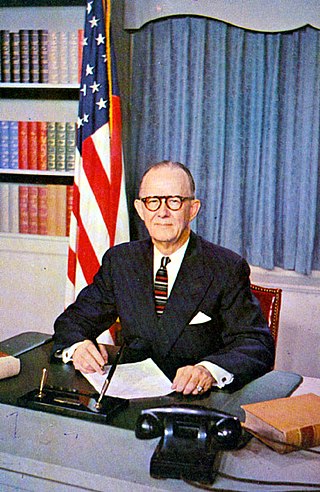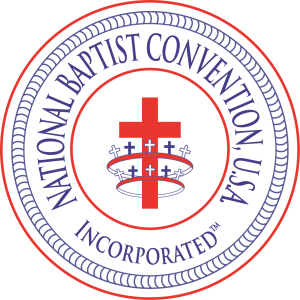Related Research Articles
Baptists are a denomination of Protestant Christianity distinguished by baptizing only professing Christian believers and doing so by complete immersion. Baptist churches generally subscribe to the doctrines of soul competency, sola fide, sola scriptura and congregationalist church government. Baptists recognize generally two ordinances: baptism and communion.

Union Parish is a parish located in the north central section of the U.S. state of Louisiana. As of the 2020 census, the population was 21,107. The parish seat is Farmerville. The parish was created on March 13, 1839, from a section of Ouachita Parish. Its boundaries have changed four times since then.

James Philip Eagle was an American politician who served as Speaker of the Arkansas House of Representatives and as the 16th governor of Arkansas, a Baptist minister, and president of the Southern Baptist Convention. He was a Democrat.

Thomas Stevenson Drew was the third Governor of the U.S. state of Arkansas.

John Griffin Carlisle was an American attorney and Democratic Party politician from Kentucky. He represented Kentucky in the United States House of Representatives from 1877 to 1890, serving as the 31st Speaker of the House from 1883 to 1889, and served in the United States Senate from 1890 to 1893. He served as the 41st Secretary of the Treasury, in the second administration of President Grover Cleveland, from 1893 to 1897—a period that included the Panic of 1893. As a Bourbon Democrat he was a leader of the conservative, pro-business wing of the party, along with Cleveland.

Lawrence Brooks Hays was an American lawyer and politician who served eight terms as a Democratic member of the United States House of Representatives from the State of Arkansas from 1943 to 1959. He was also a president of the Southern Baptist Convention.

Levi Lincoln Jr. was an American lawyer and politician from Worcester, Massachusetts. He was the 13th governor of Massachusetts (1825–1834) and represented the state in the U.S. Congress (1834–1841). Lincoln's nine-year tenure as governor is the longest consecutive service in state history; only Michael Dukakis, John Hancock and Caleb Strong served more years, but they were not consecutive.

William Jonathan Northen, was the 54th Governor of Georgia from 1890 to 1894, as well as a leading Baptist minister. Northen was president of the Georgia Baptist Convention from 1892 to 1910, and president of the Southern Baptist Convention from 1899 to 1901. His political rhetoric was based on his religious outlook, and often focused on racial issues at a time when lynching was increasing. Northen believed that advances in medicine and health would ultimately help African Americans achieve salvation. He promoted the ideology of the modernizing New South, but did not abandon the policy of white supremacy.

During the American Civil War, Arkansas was a Confederate state, though it had initially voted to remain in the Union. Following the capture of Fort Sumter in April 1861, Abraham Lincoln called for troops from every Union state to put down the rebellion, and Arkansas along with several other southern states seceded. For the rest of the civil war, Arkansas played a major role in controlling the Mississippi River, a major waterway.

This is a selected bibliography of the main scholarly books and articles of Reconstruction, the period after the American Civil War, 1863–1877.

Calvary Baptist Church is a Baptist church located in the Chinatown neighborhood in Washington, D.C. affiliated with the American Baptist Churches USA, the Cooperative Baptist Fellowship, the Baptist Peace Fellowship of North America, the Alliance of Baptists, the District of Columbia Baptist Convention, and the Association of Welcoming and Affirming Baptists.
The 1848 Democratic National Convention was a presidential nominating convention that met from Monday May 22 to Friday May 26 in Baltimore, Maryland. It was held to nominate the Democratic Party's candidates for President and Vice president in the 1848 election. The convention selected Senator Lewis Cass of Michigan for President and former Representative William O. Butler of Kentucky for Vice President.
The Georgia Baptist Mission Board is an association of Baptist churches in the U.S. state of Georgia. It is one of the state conventions associated with the Southern Baptist Convention. Formed in 1822, it was one of the original nine state conventions to send delegates to the first Southern Baptist Convention, organized in 1845.
The Baptist State Convention of North Carolina (BSCNC) is an autonomous association of Baptist churches in the state of North Carolina. It is one of the state conventions associated with the Southern Baptist Convention. Headquartered in Cary, North Carolina, the convention is made up of 77 Baptist associations and around 4,300 churches as of 2012. The convention is led by three officers, elected annually during the annual meeting of the convention. The convention is also led by an Executive Director-Treasurer (EDT). The current EDT is Rev. Todd Unzickers, who was elected by the convention in May 2021.

The Mississippi Baptist Convention Board (MBCB) is an autonomous association of Baptist churches in the U.S. state of Mississippi. It is one of the state conventions associated with the Southern Baptist Convention. Formed in 1836, it was one of the original nine state conventions to send delegates to the first Southern Baptist Convention, organized in 1845.

During the American Civil War, the state of Illinois was a major source of troops for the Union Army, and of military supplies, food, and clothing. Situated near major rivers and railroads, Illinois became a major jumping off place early in the war for Ulysses S. Grant's efforts to seize control of the Mississippi and Tennessee rivers. Statewide, public support for the Union was high despite Copperhead sentiment.

The National Baptist Convention, USA, incorporated as the National Baptist Convention, USA, Inc., and more commonly known as the National Baptist Convention, is a Baptist Christian denomination headquartered at the Baptist World Center in Nashville, Tennessee and affiliated with the Baptist World Alliance. It is also one of the largest predominantly and traditionally African American churches in the United States, and was the second largest Baptist denomination in the world in 2016.

The 1928 United States presidential election in Arkansas was held on November 6, 1928, as part of the 1928 United States presidential election. State voters chose nine electors, or representatives to the United States Electoral College, who voted for President and Vice-president.

Elias Camp Morris was an American minister, politician, and businessman. Born a slave, Morris attended seminary then preached at Centennial Baptist Church in Helena, Arkansas. He rose to prominence among black Baptists, leading the Foreign Missionary Convention. When the convention merged with two other black Baptist organizations in 1895, Morris became the president of the resulting National Baptist Convention, leading it for twenty-seven years. Morris was also active in the Arkansas Republican Party, serving as a national delegate three times, and co-founded the Arkansas Baptist College.

The 1888 Arkansas gubernatorial election was held on September 3, 1888.